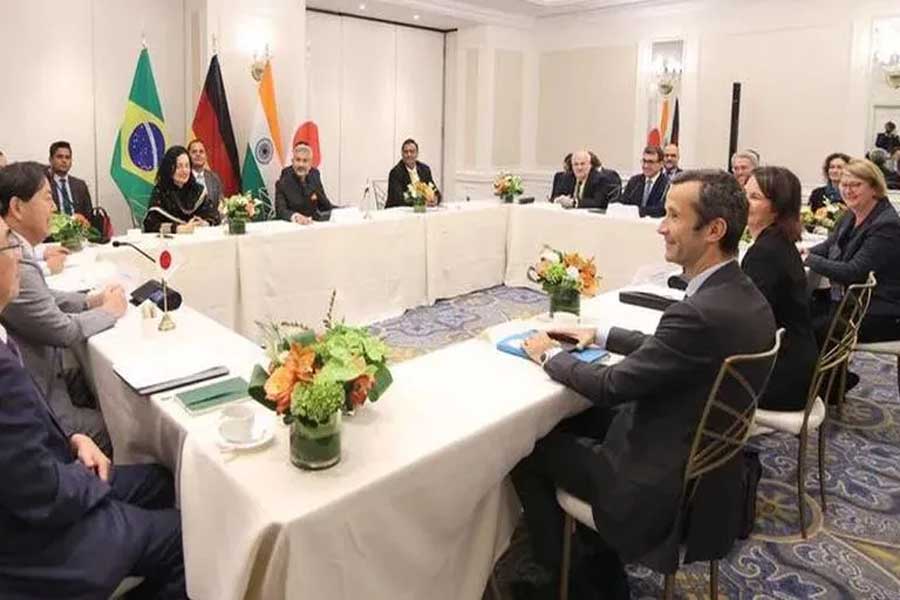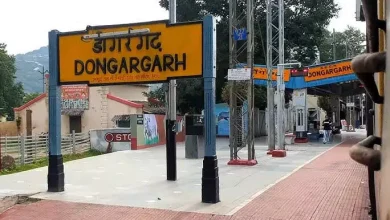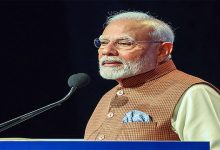
The G4 countries of Brazil, Germany, Japan and India warned that the longer it takes to reform the UN Security Council, the more its effectiveness will be called into question and voiced strong concern over the persistent absence of meaningful progress in the matters in the Inter-Governmental Negotiations (IGN).
Foreign Minister of Brazil Mauro Vieira, Federal Foreign Minister of Germany Annalena Baerbock, Minister for Foreign Affairs of Japan Yoko Kamikawa and Secretary (West), Ministry of External Affairs Sanjay Verma met on Thursday on the margins of the 78th Session of the United Nations General Assembly to discuss the state of play of the negotiations for the reform of the UN Security Council.
The Ministers emphasised the importance of forthcoming milestone events, such as the Summit of the Future in 2024 and the UN 80th anniversary in 2025, for decisive progress and tangible results on Security Council reform.
“The Ministers stressed that the future of international governance structures rests on their capacity to adapt and remain fit for purpose. The longer it takes to reform the UN Security Council, the more its effectiveness will be called into question,” the G4 Ministerial Joint Press Statement issued here said.
It added that the G4 Ministers underscored that multilateralism is under significant strain due to multiple and complex crises and concurred that the Security Council’s inability to effectively and timely address contemporary global challenges “reinforces the urgent need for its comprehensive reform so that it better reflects contemporary geopolitical realities.” The G4 Ministers also noted the steps taken to improve the visibility and transparency of the Inter-Governmental Negotiations (IGN), such as the introduction of webcasting and the establishment of a website to be a repository of all IGN-related documents.
“At the same time, the ministers voiced strong concern over the persistent absence of meaningful progress on Security Council reform in the IGN,” the statement said adding that the Ministers noted the Co-Chairs’ proposal for a structured dialogue on individual models proposed by States and Groups and encourage renewed efforts by the President of the General Assembly and the Co-Chairs to commence text-based negotiations without any further delay in the IGN.
They stressed, in doing so, the importance of adhering to the decision-making requirements and working methods laid out in the Charter of the United Nations and the rules and procedures of the General Assembly.
“They reiterated their commitment to address the issue in the upcoming 78th Session of the UNGA and agreed to intensify dialogue with all Member States, with an aim to achieve concrete outcomes within a fixed time frame,” it said.
Reiterating that expansion of the UN Security Council in both permanent and non-permanent categories of membership is essential to make the body more representative, legitimate, effective and efficient, the G4 Ministers agreed on the need to enhance the role and participation of developing countries in the Security Council, in both categories.
“Recognising the historical injustice with regard to representation in the Security Council, they underlined the importance of increasing participation of under-represented and unrepresented groups and regions, such as Africa and Latin America and the Caribbean,” the joint press statement said.
They also noted a record number of Member States that explicitly acknowledged the need for reform of the UN Security Council and emphasised the renewed momentum to advance the discussions on this critical and urgent issue.
Agreeing on the need to enhance the role and participation of G4 members as major contributing countries to the maintenance of international peace and security in the Security Council, the G4 Ministers reiterated their support for each other’s candidatures as aspiring new permanent members in a reformed Security Council, which they aimed to achieve through an open, transparent and democratic process, consistent with the UN Charter.
















